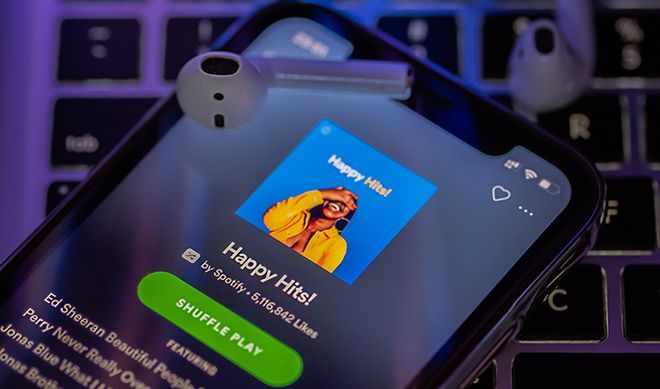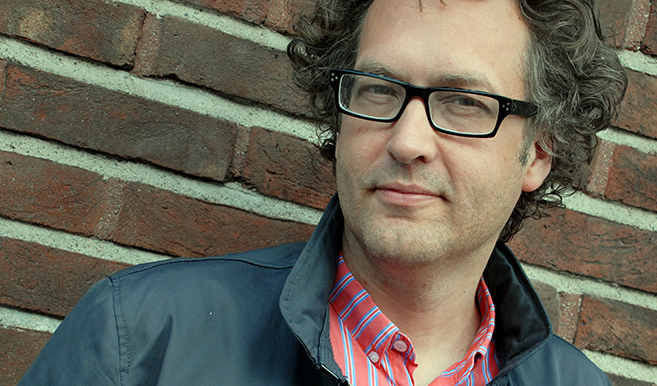The internet was supposed to democratize music, but artists are still dependent on major labels to break trough and make big money, according to researchers at the University of Oslo.

Spotify's playlists offer music for every mood. More than 30 per cent of all streams happen through these playlists.
Photo: Omid Armin/Unsplash.
Most people agree that everyone who creates great works of art should get paid for what they do. But how can one trust that greedy middlemen don't run away with the artists' fair share?
"There are traditions going back centuries that protect artists, so that they can continue to make music that many people can enjoy. Currently, the consensus is that the system for ensuring this is not working properly," says Yngvar Kjus, associate professor of Music and Media at the University of Oslo.
This is partially due to the rapid digitisation of the music industry. Kjus heads a research project that for the past three years has examined what happened to copyrights and economics when music rapidly moved from a physical format to the internet.
Streaming services have taken over
Today, you can access a huge selection of music through commercial streaming services such as Spotify and Tidal. If you can stand advertisements, you can also watch and listen for free on Youtube. How much of the money that ends up with the artists depends entirely on the contracts they have with their intermediary, often a record company.
"Revenue from streaming increases. In the contracts we have studied, we see that the record companies promise the artists up to 18 percent of this revenue. That is an increase," says Kjus.
He encourages artists to read carefully through their contracts.
"Whilst the fee looks good, the artists are expected to cover more of the production costs. Some companies ask them to cover the cost for mixing and mastering themselves."
Not long ago, when you bought a CD, a share of the payment ended up with those who had made it, the size of which depended on the agreements with the intermediaries. Today, the calculation is based on the number of streams on the streaming services, and agreements between the various mediators, such as the artist, record company, distributor and streaming service.
"The main difference is that the streaming money is not distributed directly from listener to artist, but that the artist's share corresponds to the share of the total streaming. For certain genres and artists, this has major consequences."

Stratification within the streaming economy
Kjus has interviewed 18 established Norwegian artists regarding economics and copyright, several of whom suspect that the major artists receive the lion's share from the current economic model. The researcher admits that they are partly right in their assumptions.
"Those who want to earn a lot must be backed by a major company. At the same time, you are vulnerable to rapid changes - you can be given a low priority if they want to focus their efforts on another of their artists."
Therefore, many of the artists prefer to manage themselves. It has its advantages, although the forecast that intermediaries such as record companies, management and PR agencies would become redundant has not occurred.
"It has become easier to produce music yourself, but distribution has become more difficult than ever," says Kjus, who sees a clear stratification within the new streaming economy.
"You still have a large undercurrent and many are able to have meaningful experiences of creating and listening to music on Soundcloud or Youtube. But the major companies have managed to use the transition to streaming to strengthen their own position."
Fraud and distrust
"The concentration of power is enormous within the music industry. It is difficult to succeed if you do not get the right placement on Spotify or are included in their playlists," says Arnt Maasø, associate professor at the Department of Media and Communication.
He has interviewed directors of the record companies and other players within the industry about the situation in the digital market, and tells of a strong feeling of ambivalence.
"Many people feel completely dependent on being present on the streaming services, but struggle to trust these agents," he says.
A third of those who have responded in a large survey conducted by MUSEC, say that they are skeptical of the numbers the streaming services provide. Maasø links the distrust to the 2018 Tidal scandal, among other things. In this scandal, investigative journalists for Dagens Næringsliv and researchers at NTNU revealed that Tidal's figures for Kanye West and Beyoncé had been manipulated by someone within the company.
"Additionally, there have been examples of fraud, with some companies attempting to increase the streaming share of their artists with the help of robots. Reports from investigative journalists suggest that it could account for as much as 2-3 percent of the streaming, which amounts to a lot of money," says Maasø.
"Spotify says that they are working on this, but do not state how large the amount is," he continues.
Although artists and record companies are dissatisfied with the lack of transparency from the streaming platforms, Maasø reminds us that it was not necessarily better before, when record companies held their cards close to their chests and some bands never received the money they were promised. The possibilities of manipulating the system may, however, have even greater consequences today.
"The whole world is one market. It's not like when label managers went and bought all the singles they released themselves in order to get the songs on the sales list. When you use robots to increase the streaming numbers and steal a larger portion of the money, you affect things on a whole new scale."

Major players have all the advantages
Skepticism notwithstanding, the streaming figures from Spotify are useful to the industry.
"Many find that it provides another opportunity to make choices on behalf of artists. They can see if they are reaching new audiences or schedule concerts where they know more people are listening," says Maasø.
Which songs will be boosted by Spotify's curated playlists is almost impossible to predict. More than 30 percent of the listening occurs here, and when Spotify also offers to curate the musical expression of major brands like McDonald's through Spotify for brands, they control even more of the streaming activity.
Yngvar Kjus believes this should benefit the artists, and suggests that the legislation be adjusted in order to match the listening model.
"The copyright law distinguishes between the music each individual chooses to listen to, and the playback that is not controlled by each individual, such as radio, TV advertising, and so on," he says.
The latter is monitored in Norway by Gramo, who demands a fee for all such playback.
"Spotify's playlists can in many ways be compared to the way music is played on the radio, since you do not actively seek out the artists yourself. The performers should be allowed to take part in that value creation. For example, one could develop a model to supplement the payment that goes from us, via the record companies, and out to the artists."
More awareness of rights today
Succeeding financially in today's music market is about the path from production to the ears of the listener, and securing the right to get paid for it ending up there. Knowing your rights is more important than ever.
"There is a difference between owning a work and owning a recording. Many of the artists who have not collaborated with a producer, but are responsible for the recording themselves, are conscious of the fact that they own 100 percent of the music. They have rights to the song and the recording, and know that they are two different things," says Kjus.
Very few people probably think about law and economics when they start making music. But Kjus sees that awareness of copyright is increasing within the Norwegian music life, and believes that many have understood that a membership in organisations such as Creo and GramArt, is valuable. They all balance between creativity and calculations.
"If you publish a lot of music and own everything, it may provide income in the long term."
Music on demand: Economy and copyright in a digitised cultural sector (MUSEC) is a research project at the Department of Musicology at the University of Oslo. Yngvar Kjus, Arnt Maasø, Anja Nylund Hagen, Ruth Towse and Olav Torvund have investigated how values and rights are negotiated and evaluated when music is produced and distributed via digital media.






